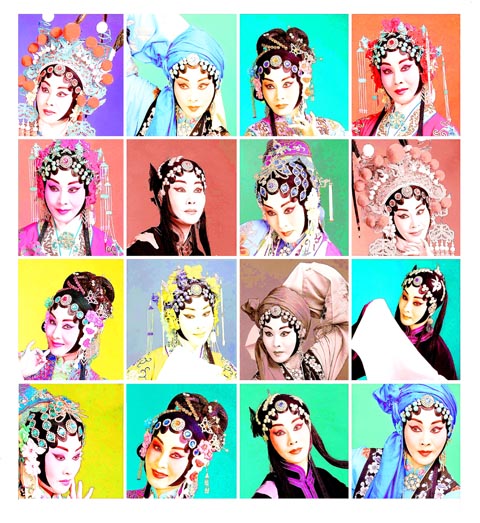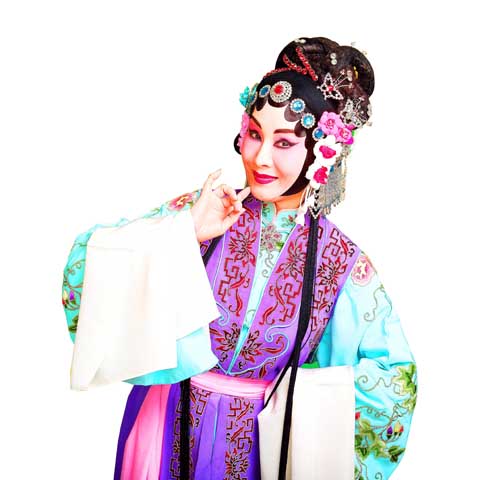To master one style of opera is generally regarded as a great achievement. To perform four operas in four different styles over four days might seem to be showing off. But that is exactly what diva Wei Hai-ming (魏海敏) is doing in the series of operas that opened yesterday at Taipei City’s Metropolitan Hall (城市舞台). Fresh from winning Best Traditional Music Interpretation at the Golden Melody Awards for The Ultimate of Peking Opera — Wei Hai-min Performance Mei Lanfang School (芳華現 — 魏海敏梅派經典唱段選輯), Wei is setting out to show that she is not only a master of the Mei Lanfang (梅蘭芳) school, but can also put on a great performance in the styles of Zhang Chun-chiu (張君秋), Cheng Yen-qiu (程硯秋) and Xun Hui-sheng (荀慧生).
Wei is a third-generation disciple of Mei Lanfang, widely regarded as the greatest Beijing opera performer of the 20th century. She also studied with Mei’s son, Mei Baojiu (梅葆玖), who has achieved enormous success as a performer and will be making a guest appearance in Sunday’s performance.
Mei specialized in playing the female dan (旦) role in Beijing opera, as did the other three masters, all men, whose works feature in the four-day program.

PHOTO COURTESY OF THE WEI HAI-MING CHINESE OPERA FOUNDATION
Beijing opera revival
In a lecture given at the Sun Yat-sen Memorial Hall (台北國父紀念館) in April, Wei underlined the innovation that went into the creation of the four major schools, and the new operas that were created by these masters in the first half of the 20th century. “In the early days of Beijing opera’s development, the male role always predominated. It was only after a ban on women performing opera handed down by the imperial court (who feared the corrupting influence of the theater on women) that this generation of male performers of the dan role came into being. The founders of the four schools did much to develop female characters for Beijing opera, since these artists found that the traditional modes of performance were inadequate to their aspirations,” she said.

PHOTO COURTESY OF THE WEI HAI-MING CHINESE OPERA FOUNDATION
Although Wei is most closely associated with the Mei school, she has studied the other styles during her long career.
“If you perform in just one style, you become two-dimensional. If you sing in other styles as well, you can enrich your performance. The characters that I play [in these operas] have developed over many decades to achieve full maturity of expression, and so by learning to perform them, you learn new ways of giving expression to all the characters you play,” Wei said in an interview with Taipei Times.
Her desire to go beyond narrow limits can also be seen in her ventures into more modern styles of performance, such as collaborations with Wu Hsing-guo’s (吳興國) Contemporary Legend Theater (當代傳奇劇場), and operas such as the National Guoguang Opera Company’s (國立國光劇團) The Golden Cangue (金鎖記), the staging of a modern short story using elements of both Beijing opera and modern drama, which attracted sellout crowds last month despite being the third revival since 2005.
The current series of performances harks back to the heyday of Beijing opera, and Wei said she was eager to show the unique artistic contributions made by the different schools. She emphasized the very significant variation in performance and singing styles, and said she wanted to showcase the richness and variety that existed within Beijing opera at its height. She is also working with some musicians who performed back in the 1950s and 1960s and have firsthand experience of those heady days before the splendid edifice of Bejing opera was brought down by the Cultural Revolution.
The leading Lady
Tonight’s performance of The Best Scholar’s Matchmaking (狀元媒) is the most recent of the works to be presented. It premiered in Beijing in 1960 and is taken from the famous story of the Yang Family Generals (楊家將). It is a showcase of the virtuoso “soprano” style favored by the Zhang school. Tomorrow’s performance of The Jewelry Pouch ( 鎖麟囊) will provide a complete contrast. Composed in 1940, the opera is one of the classics of Cheng-style Beijing opera, featuring Cheng Yen-qiu’s signature “sound from the back of the head” (腦後音), with its resonant textures and nuanced feeling. Sunday’s performance, Song Jiang Kills His Concubine (坐樓殺惜), is a seldom-performed work of the Xun school, a violent story of love, betrayal, retribution and death that requires enormous physical stamina from the performers and great skills in switching between song and reciting. The program opened yesterday with Wei performing Regrets of Life and Death (生死恨), a classic work of the Mei school. All these operas where created as vehicles for the leading lady.
As for why she wants to take on this challenge, she said that it was like “submitting a report card on my career in the theater.”
Wei said it was important that she throw herself into these different kinds of performances at this point in her career. “I do as much as I can. I still have the energy to put on a show like this, to do things that differ from convention [such as performing in different styles on different nights]. This sort of thing naturally has some publicity value; it shows that there is still life and vitality within the medium of Beijing opera, that it is still moving forward,” she said. “But what will come of it in the end, I cannot say.”

April 28 to May 4 During the Japanese colonial era, a city’s “first” high school typically served Japanese students, while Taiwanese attended the “second” high school. Only in Taichung was this reversed. That’s because when Taichung First High School opened its doors on May 1, 1915 to serve Taiwanese students who were previously barred from secondary education, it was the only high school in town. Former principal Hideo Azukisawa threatened to quit when the government in 1922 attempted to transfer the “first” designation to a new local high school for Japanese students, leading to this unusual situation. Prior to the Taichung First

The Ministry of Education last month proposed a nationwide ban on mobile devices in schools, aiming to curb concerns over student phone addiction. Under the revised regulation, which will take effect in August, teachers and schools will be required to collect mobile devices — including phones, laptops and wearables devices — for safekeeping during school hours, unless they are being used for educational purposes. For Chang Fong-ching (張鳳琴), the ban will have a positive impact. “It’s a good move,” says the professor in the department of

On April 17, Chinese Nationalist Party (KMT) Chairman Eric Chu (朱立倫) launched a bold campaign to revive and revitalize the KMT base by calling for an impromptu rally at the Taipei prosecutor’s offices to protest recent arrests of KMT recall campaigners over allegations of forgery and fraud involving signatures of dead voters. The protest had no time to apply for permits and was illegal, but that played into the sense of opposition grievance at alleged weaponization of the judiciary by the Democratic Progressive Party (DPP) to “annihilate” the opposition parties. Blamed for faltering recall campaigns and faced with a KMT chair

Article 2 of the Additional Articles of the Constitution of the Republic of China (中華民國憲法增修條文) stipulates that upon a vote of no confidence in the premier, the president can dissolve the legislature within 10 days. If the legislature is dissolved, a new legislative election must be held within 60 days, and the legislators’ terms will then be reckoned from that election. Two weeks ago Taipei Mayor Chiang Wan-an (蔣萬安) of the Chinese Nationalist Party (KMT) proposed that the legislature hold a vote of no confidence in the premier and dare the president to dissolve the legislature. The legislature is currently controlled